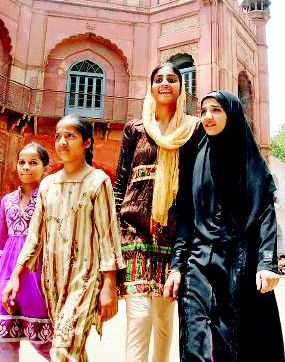
New Delhi, May 27: For the first time in its history, burqas will sweep down the narrow stairs and edges of dupattas brush the ancient walls of the Anglo-Arabic Senior Secondary School. No longer only for boys, the 350-year-old school at Ajmeri Gate is girding up for the change, a massive step for a school that recruited its first woman teacher only in 2006. The banner at the entrance says, "Admission [is] open for girls" and for once, along with the students, the school has a lot of prep to do.
The Delhi high court ordering the Directorate of Education and Delhi Police to ensure the school's decision to go co-ed is "duly implemented" made it possible. By Saturday afternoon, four girls had joined - two in Class XI, one in Class VIII, the youngest in VI, and all in English-medium. The school's governing body, Delhi Education Society, is hoping they'll have at least 50 girls using their classrooms by the time term begins.
Three of the four girls were studying at local girls' schools. "I wanted commerce but my school had only arts. That's why I am joining here," says Darakshan Fatima (17). If there's one major flaw in the existing institutions for girls that compels them to seek admission at Anglo-Arabic, it's that they do not offer science or commerce, perhaps assuming girls don't have the temperament for it. "Even when we recruit, almost all the women applicants have studied arts," says Khalil Ahmed, joint secretary, Delhi Education Society. Darakshan hopes to be a chartered accountant and her fellow applicant, Mehwish Rehmani (16), wants to teach math. The other two girls, Gulafshan (12) and Ramsha (13), are sisters of Darakshan.
Having functioned in a particular way for three-and-a-half centuries, the school authorities are trying to make the transition as smooth as possible. At least one toilet has to be freed for the girls and a space cleared up for a common room. The uniform will probably be salwar-kameez-dupatta in grey and white.
"We'll make any investment to make them comfortable," says manager Atyab Siddiqui. "Immediately after school reopens, we will have a workshop with psychologists and counsellors to talk to teachers and students." Science teachers Pervez Ahmed and Aftab Alam have already started talking to their students. "I gave them the example of Hamdard Public School," says Alam. "If our Walled-City kids can attend a co-ed school there, what's wrong with having one here?" Khalil says, "A girls' school was necessary. No new school for girls has come up in the area in the last two-three decades but population has gone up." The school is planning self-defence classes for girls.
"I know Darakshan. If boys trouble her, she'll fix them," says Shahina Furquan, teaching commerce at the Anglo-Arabic Model School - a sister concern operating from the same compound. She had been asked to help draw girls to the school; she approached 60-70 sets of parents. "Most said no directly, some said they'll think about it. Parents are worried about the safety of the girls in a what has been a boys' school for so long," she says.
Only three of the 48 teachers at Anglo-Arabic are women. Faiza Nisar Ali, recruited in 2006, was the first one and was called upon to prepare the "feasibility report". "There are a number of recruitments in the pipeline. We'll give preference to women from now," says Jamia professor Azra Razzack who is the secretary of the school governing body.
All the girls, except one, are shifting from girls' schools. "We have to face boys in college anyway," says Darakshan. "We may as well get used to it now."





Comments
Add new comment